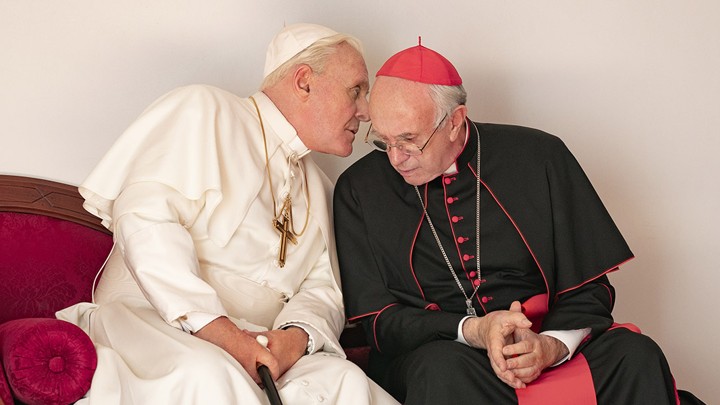
'The Two Popes' Is Entertaining to a Fault
by David Sims- Link Copied
One of the title characters of The Two Popes, Benedict XVI (played by Anthony Hopkins), has a pedometer—a Fitbit-esque wristwatch that beeps angrily at him whenever he gets too sedentary. “Keep moving! Keep moving!” a robotic voice chirps, urging him to ambulate while also providing a handy little metaphor for the themes of the movie. Fernando Meirelles’s new film dramatizes the transition of power between Popes Benedict XVI and Francis (Jonathan Pryce) that took place when the former bucked tradition by deciding to retire, opening the way to the papacy for the latter.
The Two Popes is well acted, a little overdirected, and written with the sort of narrative shorthand that summons a talking pedometer to state the script’s main thesis just in case the viewer hasn’t picked up on it yet. It’s a story about lofty subjects: the difficulty of change in one of the world’s most inherently conservative organizations, and the paradoxical fact that one man within that structure has the power to change so much. But at heart, the film is mostly a buddy comedy, an odd-couple clash between an old-fashioned stick in the mud and his more easygoing replacement. That makes it a breeze to watch—one just wonders if a movie about the modern papacy should be so cheerful.
The film is structured around a secret meeting between Benedict XVI, or Joseph Ratzinger, and then-Cardinal Jorge Mario Bergoglio of Argentina, during which the former persuades the latter to become his successor. In the opening scenes, Bergoglio finishes second in the 2005 papal conclave that elected Ratzinger; Meirelles depicts the vote, which takes place amid the somewhat oppressive glamor of the Sistine Chapel, with painstaking solemnity. Seven years later, as Ratzinger struggles to maintain the Vatican’s image amid multiple scandals, he summons Bergoglio back to Italy to hash out the strengths and limits of his philosophy versus Ratzinger’s more dogmatic approach. Such a meeting probably never happened, but the screenwriter, Anthony McCarten—who’s lately emerged as a mass producer of orderly biopics, including The Theory of Everything, Darkest Hour, and Bohemian Rhapsody—uses it to frame a dialogue about the future of the Church between a reactionary and a reformer.
Even so, The Two Popes is not interested in acting out deep ecclesiastical debates; the script confirms that Bergoglio is a little more relaxed than Ratzinger on hot-button issues such as women becoming priests, but doesn’t get into the details. Instead, the movie’s focus is firmly on Bergoglio, whom Pryce plays with a lilting Argentinian accent and unassuming charm. His progressive attitudes are indicated less by his stated positions than by his workmanlike way of dressing, his happiness to casually chat with every low-level staffer or sales clerk he meets, and his gleeful soccer fandom—all traits that have marked him as a man of the people in his native Buenos Aires.
Hopkins is in the same shuffling, mumbling mode he’s deployed in many recent performances (including his roles in the HBO show Westworld and the Thor series), and uses that appearance of absentmindedness to his character’s advantage. Ratzinger is like a wily old relative who selectively feigns deafness, perking up when he hears what he wants to hear and tuning everything else out. Hopkins quickly conveys the sharpness of the man he’s playing, but also the loneliness; Ratzinger’s devotion to his work has come at the cost of everything else. Bergoglio is his earthy opposite—someone who has clung to the real world even as he’s ascended the ladders of Catholic leadership.
Meirelles, the director of City of God and The Constant Gardener, tries to give visual flourish to an essentially stagey script wherever he can. There are snappy black-and-white flashbacks to Bergoglio’s youth in Argentina, and jolting jump cuts to specific memories. However, that material is the least engaging part of the film. An extended sequence from Bergoglio’s past that appears late in the film tries to dig through the complexities of his actions under Argentina’s military dictatorship in the late 1970s; though an interesting side note, it’s a major drag on the main plot, and the movie’s momentum never recovers.
Meanwhile, the script makes only glancing efforts to address some of the bigger controversies of Ratzinger’s reign, including the Church’s shameful record on child abuse by priests; at one point, the sound literally drops out when Ratzinger gets into the details of one sordid case. McCarten is too invested in the broad philosophical differences between these two men to get into what the popes’ choices will mean in practice, and while that makes The Two Popes a light viewing experience, it also makes it a shallow one. The chemistry between the two leads is enough to recommend the film, but don’t go into the theater expecting real historical insights.